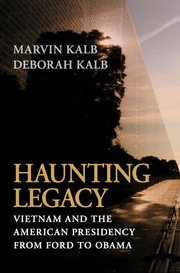Q&A with TV journalist Ted Koppel
 Monday, May 14, 2012 at 5:34PM
Monday, May 14, 2012 at 5:34PM Ted Koppel, the legendary television journalist, former “Nightline” anchor, and author, covered the Vietnam War for ABC News.
Q: As someone who covered the war in Vietnam, how do you think the reporting of that war differed from the reporting of more recent conflicts?
A: Because of the draft, many more American families had "skin in the game." The level of interest, (at times bordering on obsession) with the weekly casualty lists prompted the U.S. television networks to maintain huge bureaus in Saigon. It was not unusual for there to be two or three stories a night on the evening news programs relating to developments in Viet Nam. Remember, casualties at times rose to four and five hundred dead a week. The United States lost almost as many troops in a month in Viet Nam as it did during the entire involvement in Iraq. Viet Nam was, from the mid-sixties on, an issue of paramount political importance; ending, as it did, the Johnson administration. There has never been a point in any subsequent conflict, at which public interest, and therefore news coverage, has matched what occurred during the war in Viet Nam.
Q: Which post-Vietnam War president that you covered do you think was most affected by the war in Vietnam in making his own decisions about sending troops into battle?
A: President Clinton, who required that U.S. bombers over the former Yugoslavia fly at sufficient altitude that they not be vulnerable to anti-aircraft fire or missiles, was obsessed with keeping any U.S. airman or ground forces out of the hands of the Serbs. Therefore, the planes flew high and neither ground forces nor the much-vaunted Apache helicopters were ever deployed.
Q: What impact do you think the draft played in presidential decision-making during the Vietnam War, and how might President Obama's decisions be different if there were a draft today instead of a volunteer force?
A: One cannot over-estimate the importance of the draft, then and now. Ever since the draft ended, under President Nixon, there has been an inexorable drift toward depersonalizing war. The draft was followed by an all-volunteer military; men and women who were professionals and could therefore be said to have "signed up to fight." The all-volunteer army has been buttressed and, in some cases, displaced by hundreds of thousands of private contractors. Their deaths and injuries are not announced and barely noticed.
President Obama, more than any of his predecessors, has deployed small units of special operations forces, supported by civilian contractors, CIA officers and, of course, pilotless drones. The trend has been towards invisible wars, fought by anonymous warriors.
Q: When you started anchoring the program "America Held Hostage" on ABC during the Iran hostage crisis in 1979--a program that eventually became "Nightline"-- did you think the hostage crisis would last as long as it did?
A: Nobody thought it would last 444 days; but, interestingly, when ABC set up facilities for our nightly "America Held Hostage" reports, new phones were installed, with our own extension. That number: 444.
Q: What lessons do you think the United States learned from the hostage crisis?
A: President Carter made a couple of crucial mistakes early in the hostage-taking. I don't recall the precise wording, but he said something along the lines of "the hostages are the first thing I think about in the morning and the last thing I think about at night." He thereby signaled just how much leverage they had to the hostage-takers. He also said (again, not a precise quote) "we won't do anything to endanger the hostages, but once they are released the slate will not be wiped clean." He could not have provided greater comfort and motivation to those holding our hostages than by expressing those thoughts.
Have subsequent presidents learned from his mistakes? Certainly Ronald Reagan did not. The Iran-Contra disaster flowed out of yet another mishandling of a hostage crisis that was controlled by the Iranians. The very nature of our media-centric society makes it difficult to deal with any hostage crisis. Our leaders need to act as though the fate of the hostages is irrelevant to the interests of the United States. The media make that, essentially, impossible.
Interview with Deborah Kalb, co-author of Haunting Legacy.



Reader Comments